- Home
- Jeff Mariotte
Serpents in the Garden Page 13
Serpents in the Garden Read online
Page 13
“Three hours. Four, maybe.”
“Tie him up, Mister Rowland. Make it tight, but not painfully so. I’ll go next door and see about finding us something to wear.”
* * *
Soon, dressed in baggy clothes with a texture resembling that of burlap bags and about as comfortable, Kirk and Rowland made their way toward the center of the city. They still carried the rifles, but as many of the Victors they saw were armed as not, so that didn’t make them stand out. Their Freehold clothing was stuffed in a leather pouch draped across Rowland’s chest. They had left the big man in his house, where his wife would find him when she came home. That gave them a few hours to get a look at Victory—more if, as he’d promised, he didn’t raise an alarm. Kirk didn’t trust that, however. The man had apparently not seen them as threats, but that didn’t mean he would stake his city’s safety on that impression.
“I sure hope we learn somethin’ here, sir,” Rowland said. “Because I got a feelin’ there’s gonna be some bad chafing before the day’s out.”
“I know what you mean,” Kirk agreed. “If I had to wear these all the time, I’d be grumpy too.”
After they crossed a bridge—the river seemed to be a dividing line between neighborhoods primarily comprising single-family dwellings and a more high-density residential-commercial mix—the more crowded the city became. Here, buildings were crammed close together, lining crowded roads. They passed a knot of people standing in the street, arguing with a vendor about the high prices for his meats. Steam rose from covered bins on his cart, wafting the aroma of his wares into the road and making Kirk’s mouth water. Others sold produce that looked inferior in every way to that cultivated by the Freeholders; knives and other hand tools and weapons; and various decorative items, including forehead ornaments like those worn by just about every male on Neural, cheek decorations like the women wore, and multicolored metal bracelets that Kirk mostly saw adorning the wrists of small children. Others carried merchandise on their bodies, around their necks, or pinned to long sashes that draped over their shoulders. Shopkeepers stood in open doorways, enticing customers inside with well-rehearsed sales pitches.
“Commercial enterprise seems alive and well here,” Kirk observed.
“People are buyin’, too,” Rowland said. “Guess not every worker is slave labor.”
“They might be employed in support of the mines,” Kirk said. “Or in trades like construction and retail that boom when the city grows. It’s even possible that the Klingons are pumping currency into the economy.”
“Why would they do that?”
“We don’t know what they want here,” Kirk reminded him. “When we do, maybe we’ll know why.”
Brilliant-hued, rainbow-colored birds lined rooftops and perched on chimneys and windowsills, like pigeons in cities back home. Doglike animals, with white or bright red or forest green fur and small, sharp tusks sprouting from their snouts, wandered the roads, sniffing and relieving themselves wherever they felt the need, scrounging dropped food or clustering around butcher shops and food carts. The smells from those carts and storefronts had to compete with the omnipresent stink of the smelter. The air felt almost gritty from the layer of smoke overhanging the city. And despite the bustle of the city streets, Kirk heard a constant rumble, punctuated by booming sounds that he felt in his teeth. A function of the mining or smelting operation, he supposed.
Past the city’s center, the roads became wider, with buildings a little more spread out. This side of town was closer to the mine. As they strolled, trying to appear casual, in that direction, Rowland grabbed Kirk’s arm.
“What is it?” Kirk asked.
“It took me a while to figure it out,” Rowland said. “But, well, look at those men.” He nodded toward a couple of men headed toward them, on the other side of the road. Their clothing looked, at first glance, like what everybody else was wearing—baggy, off-white shirts and pants of some rough, woven material. But as he eyed them, Kirk realized that the embroidered designs on both men were identical. They both wore long knives tucked into their wide leather belts and had rifles slung on their backs, straps cutting diagonals across their chests.
“They’re law enforcement,” Kirk said. “Or military.”
“That’s what I’m thinkin’.”
Kirk and Rowland made a right turn at the nearest corner, which took them away from the two men. But on this road, there were four more people, wearing the same uniforms, and similarly armed. A couple of these were women. They stood in a casual circle, chatting. A couple of them glanced up at Kirk and Rowland.
Having deliberately turned the corner, the men couldn’t change course again without raising suspicions. That understanding passed between them with a quick look, and they kept going, heads down, not staring.
“City guard, I guess,” Kirk said softly. “Tyree said they don’t have a standing army, as such, but most adults take part in hunting and slaving parties from time to time. They’re watching us.”
“I know.”
“They’re curious, but I don’t think they have any grounds to approach us. We don’t look like criminals, do we?”
“No, sir. Spies, maybe.”
Kirk risked a quick peek to make sure there was a smile on Rowland’s face.
Nearing the four uniformed guards, they let the conversation cease, so nothing in their accents or tones would reveal them as outsiders. Kirk looked over at the guards once, trying to appear natural, and tossed them a friendly smile. One of the men swiveled and took a step in their direction. Kirk’s muscles tensed, ready to fight or run. But before the man moved again, one of his friends caught his shoulder and said something. The man turned back to his colleagues. After a few more words, they all broke into raucous laughter.
“Something’s funny,” Kirk said.
“Well, I’m just glad it’s not us.”
They walked to the end of the block without further incident and turned at the next corner, once again headed toward the mine. Along the way, they saw fewer and fewer civilians, and more and more uniformed guards. “There’s something in this neighborhood that the Victors want well protected,” Kirk said.
“Only thing I see of any value is the mine,” Rowland said.
“But is the reason for all the uniforms the mine’s commercial value?” Kirk asked. “Or the fact that it’s the only thing the Klingons are interested in?”
“You said this used to be a quiet little village.”
“That’s right.”
“Could it have turned into such a developed city so quickly through any natural progression you can imagine?”
“No. It’s not just unlikely, it’s impossible.”
“Then the only logical explanation is that the Klingons helped. We don’t know how yet—financially, helped with infrastructure, with planning. It’s easy enough to see why—they’ve subjugated other villages, maybe even other towns and cities bigger than they were to begin with—through the use of the arms the Klingons supplied them but no one else. In order to work the mine that provides the Klingons whatever it is they need, they had to have places to house all the newcomers. They need ways to feed ’em. They need clothes and supplies. You get large, sudden population growth, you gotta have expanded goods and services to support that growth. Without help, it would have been hard, if not impossible, for the Villagers to take over all those other populations, much less grow the city to handle that influx. But with an advanced civilization showin’ them how and providin’ support, it happened. The city we’re in is the proof.”
“Circumstantial evidence,” Kirk said. “It makes perfect sense, but it’s not something the Federation Council can take to the Organians as confirmation of a broken treaty. We need something more concrete.”
Rowland pointed toward the high fence cutting across the end of the road. “Well, we’re almost at the mine,” he said. “Maybe we’ll find somethin’ there.”
The road they traveled dead-ended at the mine. Before the fe
nce was another road, running alongside the fence. It was wide, and appeared little used. Weeds had sprouted between some of the stones. Kirk thought that odd, until they actually reached it and began to cross it. When they did, armed and uniformed guards came toward them from both directions, four from their left and three from their right. They had obviously been stationed at the fence. Along the fence line, Kirk saw more small clutches of them, staggered at irregular distances but never too far apart. No fewer than two in a group, sometimes as many as five or six. They appeared relaxed, as if this was a regular duty station but rarely one requiring any serious effort. Even the ones approaching them were sauntering, not running or marching, and their hands were at their sides instead of clutching their weapons.
“I guess maybe we’re not supposed to approach the fence,” Kirk said.
“Looks that way.”
The mine was tantalizingly close. Kirk could look through the fence and see a wide empty swath of cobblestones between it and the pit itself, like the stretch of dirt on the other side. Across that were the terraced walls he had seen earlier. What he wanted was to get right up to the edge, to look down toward the bottom, and ideally to get a better view of the offices, the supporting infrastructure around the mine, which were off to his right, visible but not in any detail. That’s where Klingons would be, if they were here at all. If they were loading ships with processed ore, there would some other kind of haulers, and facilities for the landing and maintenance of spacecraft. Those would be near the mine, but not necessarily adjacent, depending on how secretive the Klingons were about their presence and their capability.
But the guards weren’t having it. “Here now!” one of them called. He gestured Kirk and Rowland back toward the far side of the road, and when they didn’t immediately comply, he reached for his gun. “Get back! You know you’re not to approach the mine.”
“Unless you’d like to be put to work in it,” another one added.
“We just wanted a quick look,” Kirk said, trying to keep his face a mask of innocence. “It’s such an impressive sight.”
“If we wanted you to see, we’d toss you in.”
“Admiral Kirk,” Rowland whispered.
“I know,” Kirk said softly. “Sorry, didn’t mean to cause any trouble,” he told the guards. He stopped, raised his hands and shrugged his shoulders to show he’d meant no harm, and started backing up. Rowland followed suit.
“As long as you’re here,” the man said, “you’ve got your documents on you, right?”
Kirk and Rowland exchanged glances.
Documents?
Sixteen
“It is a bold plan,” Enjara said. “Of course, that is no surprise. Kirk is a bold man. A natural leader.”
“You only say that because he saved your life,” Kenomo said, laughing.
“Which I appreciate a great deal, since you stood there and did nothing,” Enjara shot back.
“It’s a stupid plan,” Keran said. Nyran was appalled to see that thug sitting with Tyree and other influential citizens of Freehold. The informal gathering was being held in the central plaza, and anyone who was interested could attend. But Keran was from Rocky Bluff, and Nyran’s ribs still ached from the last time their paths had crossed. At least the bruises had faded from his face, depriving Keran of a chance to see his handiwork in the flesh.
“Why is it stupid?” Tyree asked.
“Because it is. Walking right into the middle of Victory? What can two men hope to accomplish by that?”
“They are unknown there,” Meena said. “They seek only information. A larger party would attract attention, and most Hill People would be recognized.”
“They hardly know their way around Freehold, much less Victory. They do not know our customs. How hard will it be for someone in Victory to unmask them as spies?”
“Kirk is aware of that possibility,” Meena replied. “Yet he chose to go anyway, to risk his own life in hopes of saving ours. We should be appreciative, rather than scornful.”
“If he can stop the slavers from preying on our people, I will honor him. If he can make it so we can return to Rocky Bluff, where we belong, I will celebrate him. My fear is that both of them will be caught, and the Victors will hold us all responsible.”
Yutan rose suddenly from the log bench he had occupied. “What could they do to us worse than what they already do?” he demanded. “Kill us? They do that with depressing regularity. Enslave us? Even more common. No, my fear is not for what the Victors might do to us, but what they might do to Kirk and Rowland.”
“Their fates are no concern to me,” Keran said. “Except as they may affect our own.”
Nyran wasn’t sure what to think. From all he had seen and heard, Kirk and Rowland were good men, courageous and strong. But Keran might have a point—if they were taken prisoner, the Victors might react by increasing the pressure on Freehold.
Yutan was right, too—how much worse could things become? Already the settlement in which he’d grown up had been walled off from the world. The life of freedom he had known as a child was gone, walled off. Elders told the young ones tales about Selanee, the hero from ancient times who had led the people out of confining valleys and into the hills where he could touch the sky, how he sprouted wings and flew like a bird. Birds on the wing, the elders instructed, were the freest of all creatures, not bound to the earth or trapped behind walls. Second to birds were the Hill People, descended directly from Selanee. Sometimes, when a Hill Person saw a bird with a light cap on its head, dark wings, and a ruddy tail, he would point it out to any children nearby and shout, “Selanee watches over us!”
He had been surprised to learn that Joslen didn’t know any stories of Selanee. The people of Rocky Bluff told different stories, of different heroes, but none of her tales made any sense to him.
By taking flight, Selanee had been able to soar above enemies, to know their every movement. In that way he had protected the Hill People, allowed them to prosper, to plant crops and hunt animals and live the free life they so coveted.
Remembering that—the example of Selanee, the message implicit in every story told about him—made Nyran realize what he had to do. The adults could argue all day and night about Kirk and Rowland, and their words would make no difference. They would not help the men who had come here—some said, like Selanee, from the sky—to aid the Hill People.
It would take a hero.
Nyran slipped away from the plaza, and nobody even saw him go.
* * *
Tyree had long known that the weight of leadership was enough to make a man’s shoulders slump. When it was just his people, it had been trouble enough. Rank had certain privileges, but he was not sure that they were enough to make up for the pains. When two people quarreled, if they could not settle things between themselves, they brought their troubles to him. When the crops failed or the hunt was unsuccessful, the people looked to him for answers. When the people were threatened, they looked to him to keep them safe.
After the Victors had acquired advanced weapons and become ever more warlike, resulting in the various hill and mountain peoples banding together for safety, the new, larger population had continued to turn to him. He had thought that perhaps he could throw off that mantle, or share the burden. Instead, the newcomers, all those who now called themselves Freeholders, expected him to continue in his leadership role. He had seen no choice but to agree, though the rewards of leadership were fewer and the demands ever greater.
Leadership was particularly hard when it required a clear head. Ever since Nona had been killed, he had grown progressively angrier, vengeful. All he wanted to do was kill Victors. There were times when he was consumed by a red rage that blinded him to all else. He had to tamp it down, had to rein in his emotions for the benefit of others.
Today, the public meeting dragged on and on, seemingly endless. There was much to discuss; the attack on the fields in Providence Valley, the presence of James and Rowland, and the usual, routine issu
es of everyday life in the overcrowded settlement. Tyree was weary, and hungry, ready for a meal and a drink. Or to forget all else and go to Victory himself, to kill as many as he could.
He had lost the thread of the conversation—some ridiculous complaint about a child throwing his ball against the wall of a neighbor’s home—when the Rocky Bluff girl, Joslen, burst into their midst. Her eyes were red; tears slicked her cheeks.
“What is it, girl?” Tyree asked. He was concerned that she’d been weeping, but secretly glad for the interruption. He could ask the complainant to start over, once Joslen’s problem had been addressed, and this time he could try to pay attention.
“He’s gone!” Joslen said.
“Who?” Meena asked. “Not Nyran?”
“Of course Nyran!” Joslen cried out.
“The boy who fetched your pot?” someone else asked.
“Yes, him.”
“Gone where?”
“To Victory,” she replied. She wiped her tears with the back of her hand, sniffled once. “He thinks Kirk and Rowland are in danger there. He believes he can keep them safe. I tried to stop him.”
“He went by himself?” Tyree asked.
“Yes, by himself. All alone through the forests. All alone, to Victory itself.”
“He’s a fool,” someone else said. “He has always been a headstrong whelp.”
“Mind your tongue!” Elanna snapped. “That’s my son.”
“He went alone to Rocky Bluff, and came back none the worse for it,” Kenomo pointed out.
“Why are you sitting here talking about it?” Joslen asked. The tears filled her eyes again, rolling down her cheeks. “Someone needs to go after him!”

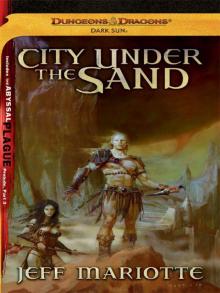 City Under the Sand
City Under the Sand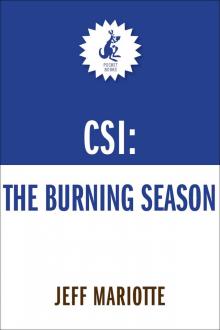 The Burning Season
The Burning Season Sanctuary
Sanctuary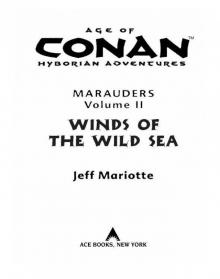 Winds of the Wild Sea
Winds of the Wild Sea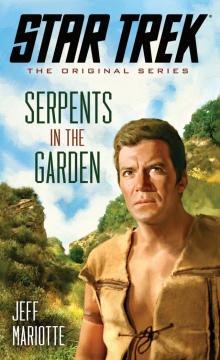 Serpents in the Garden
Serpents in the Garden Close to the Ground
Close to the Ground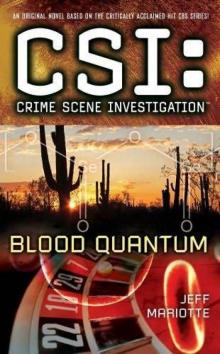 Blood Quantum
Blood Quantum Brass in Pocket
Brass in Pocket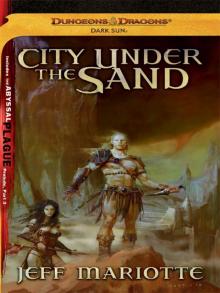 City Under the Sand: A Dark Sun Novel (Dungeons & Dragons: Dark Sun)
City Under the Sand: A Dark Sun Novel (Dungeons & Dragons: Dark Sun)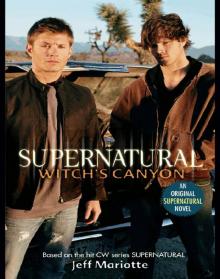 Witch's Canyon
Witch's Canyon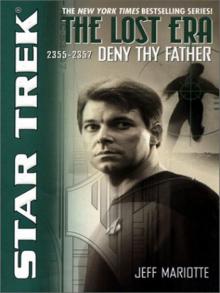 STAR TREK: The Lost Era - 2355-2357 - Deny Thy Father
STAR TREK: The Lost Era - 2355-2357 - Deny Thy Father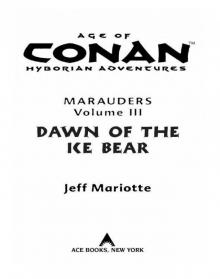 Dawn of the Ice Bear
Dawn of the Ice Bear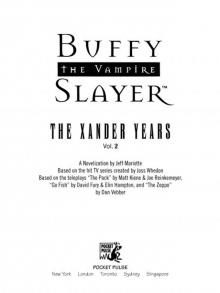 The Xander Years, Vol.2
The Xander Years, Vol.2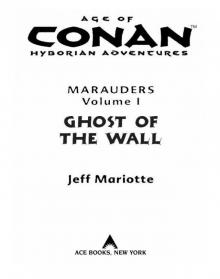 Ghost of the Wall
Ghost of the Wall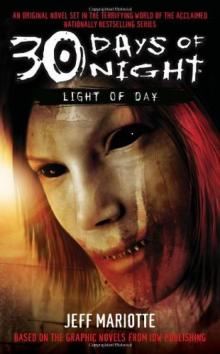 30 Days of Night: Light of Day
30 Days of Night: Light of Day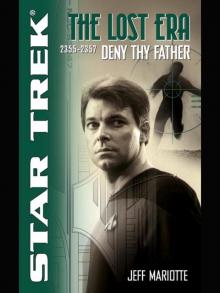 Deny Thy Father
Deny Thy Father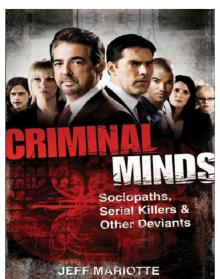 Criminal Minds
Criminal Minds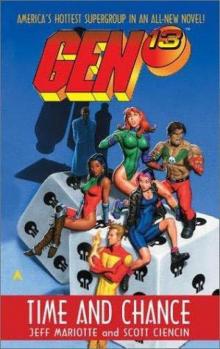 Time and Chance
Time and Chance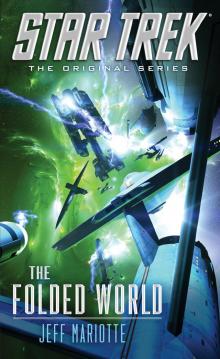 The Folded World
The Folded World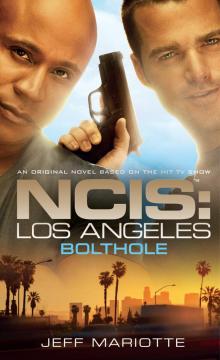 Bolthole
Bolthole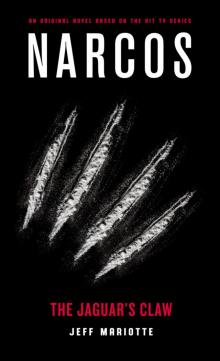 Narcos
Narcos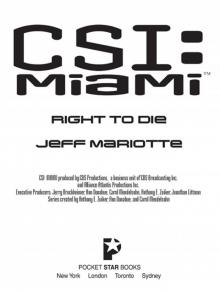 Right to Die
Right to Die